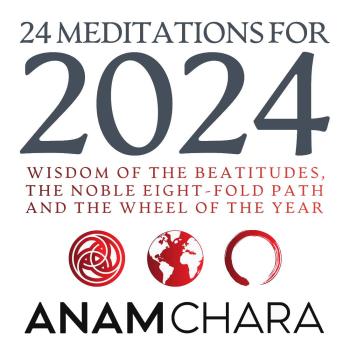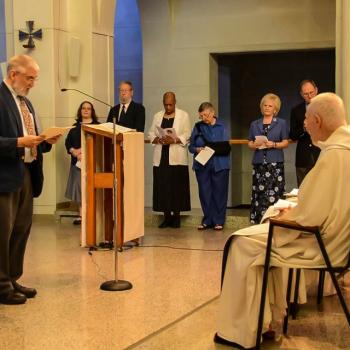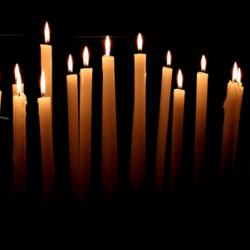A reader recently wrote this to me on Facebook:
I’ve been on a spiritual journey for some time now probably for about eight years. The last five years it has gotten more and more intense and I have traveled / practiced within various paths that have led me to various religions and spiritual practices but I seem to be having difficulty finding one that resonates with me. Every time I seem to find a path there is some form of religious dogma that comes from it that deters me and has me thinking I need to find something different…. more of my internal light. I was deeply enjoying Christian mysticism and decided to join a non-denominational church but their teachings and views are not ones I agree with, so I am left feeling out of place and almost like a phony because I don’t follow that specific belief system. Same has happened in other mystical paths such as Kabbalah and Sufism where I attempt to find a community close to home in a temple or mosque and the same thing occurs. I grew up with no religion and studied Buddhism, Hinduism and even shamanism and Wicca along with the practices mentioned above. So I guess my question is what is your advice for someone like myself? I would greatly appreciate your feedback if you’re able to reply. Thank you and I hope you enjoy the rest of your weekend.
Thanks for such a thoughtful question.
It reminds me of something I read in a book by Alan Watts, many years ago. He was decrying how religions always seem to have a message (no matter how subtle) of “We’re better than everyone else.” “We are more faithful to the Bible,” “We have a more authentic spirituality,” “We have the best music,” yada yada yada. Then he mentioned Unitarian Universalism, which is famous for insisting that each person music create their own belief system, so they’re not in the business to telling people what to believe. But even there, Watts found something to complain about: liberal churches, he pointed out, often have the subtext “We’re more tolerant than everyone else!”

The short answer to your question, which you have already discovered, is that the perfect religious community does not exist. Finding a church is like finding a spouse. There’s two dimensions, and both are equally important: “Can I truly love this person, and will they love me?” — but just as important: “Can I live with their imperfections (and can they live with mine)?”
Every human being will sooner or later let us down. Every spouse will be, in some way, a less-than-perfect life partner. So part of the spiritual work of a good and healthy marriage is learning to love each other in spite of both of your imperfections.
And often, a person’s imperfections might be somewhat related to their positive qualities. The beautiful person who turns out to be narcissistic. The bon vivant who just can’t manage to be faithful. The artist who can’t figure out how to hold down a steady job. I know these are stereotypes! But I think there’s a principle here.
So now let’s look at faith communities. The church that celebrates intellectual freedom might turn out to be a very cold and emotionally distant group of people. The one that has a great youth program might not know how to educate its adults. The one with a strong emphasis on social justice might feel more like a nonprofit organization than a sacred place where the mysteries are adored.
So… how do we find the community we can love? And the one whose imperfections we can live with?
Clearly, from what you have written, dogmatism is a trigger for you. You don’t need a church that is going to dictate your beliefs to you, thank you very much. And that makes me think you’d be much happier with the Unitarians, the liberal Quakers, the UCC, or the Episcopalians, than with churches that tend to stress a certain manner of believing, like most Catholic or evangelical churches (incidentally, it is possible to find Catholic or evangelical churches where intellectual freedom is respected and celebrated — if you’re in Atlanta, I can point you to a few great communities — but unfortunately, these churches tend to be in the minority so they’re not as easy to come by).
So my first piece of advice would be, to keep doing what you’re doing, which is to “shop around.” It might well be that you are more comfortable in a small community that is less hierarchical, like a house church or a group of monastic associates. But those kinds of communities aren’t easy to find — sometimes you have to know somebody to find a small community like that.
So my second piece of advice: look for a community of practice. Instead of trying to join a church, see if you can find a centering prayer group. Instead of joining a Buddhist sangha, look for a group of people who just like to get together to meditate. It might well be, that a practice circle is all the community you need. I believe contemplatives need community, but you don’t need institutional religion in order to find a meaningful spiritual community.
While you are looking, try to cultivate friendships with likeminded persons online. There are so many Facebook groups, for example, that are organized around a shared interest or belief. If you like Richard Rohr, join a group devoted to his teachings. Or a group devoted to centering prayer, or Celtic spirituality. Once you find a group that feels like home, see if any members live in your vicinity. Meet someplace neutral or safe (a coffee shop, perhaps) and see if there’s potential for friendships to develop. Maybe your spiritual community will be something brand new that you help to create.
Finally — going back to the marriage analogy — if the day comes that you find a community that you truly feel at home with, take the time to try to be as honest and realistic about the community’s shadow side. Can you live with it? If you can, then prayerfully consider joining that community. Recognize that, sooner or later, the community will drive you nuts — just like even a healthy marriage will at times drive both spouses to distraction. That will be part of your spiritual practice: learning to live with, to manage, to make peace with, the limitations of the community. Because every community has its limitations.
Learning With the Imperfect Community
If a community bugs you because it’s dogmatic, is it possible that you need to learn to be flexible both with your beliefs and the beliefs of others? Maybe those “dogmatic” people actually know something you don’t? (but these are only relevant questions to ask once you’ve made your commitment; let’s be real, there are a lot of dogmatic people out there who have nothing to offer, except their own anxiety which gets expressed by, well, being dogmatic!). See, here’s the thing: if you join a truly healthy and creative spiritual community, there will be people in it who have things to teach you. But your triggers might get in the way. What may look to you like dogmatism might actually be an invitation to consider truth from a new perspective.
So part of surviving in a faith community is finding the inner resilience to be able to discern when something triggers me, is the “trigger” a warning sign of other people’s dysfunction, or actually a warning sign of my dysfunction (or limitation)? There’s no easy answer to a question like this: it requires much trust, wisdom, reflection and discernment. This is just one example of the ways in which faith communities can help us to grow.
It’s not easy being a contemplative in today’s spiritual/religious landscape. Too many “spiritual but not religious” people do not appreciate the important lessons that a healthy community can teach us. But too many religionists are clueless when it comes to contemplation and mysticism. So it takes a lot of seeking to find a community that can work. It will never be perfect, and part of your spiritual practice will be learning to grow through the imperfections even as you are nurtured by the positives that the community has to offer you. Plus there are the lessons related to service, relationship-building, and learning to be compassionate to people who are sometimes very different from yourself.
I hope this is helpful! Keep looking, don’t be afraid to seek out alternative forms of community (or consider starting your own), and then learn to love through and with the imperfections. Good luck to you!
Enjoy reading this blog?
Click here to become a patron.














